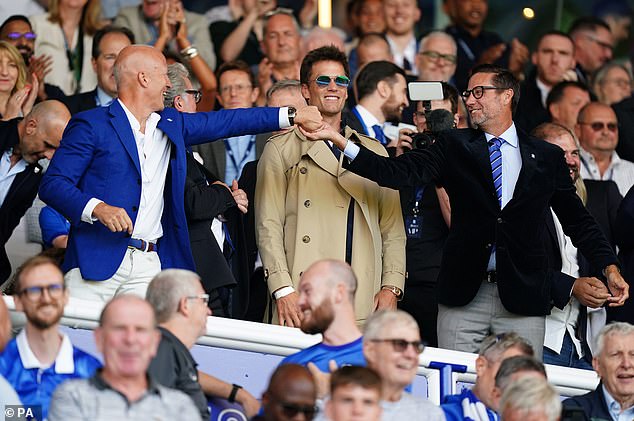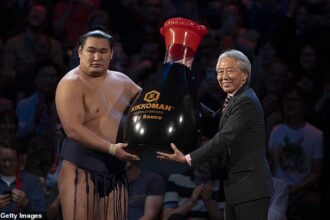The whizzkids of the modern transfer market are unanimous: the only strategy worth pursuing is to pay top price for the best young players.
So extreme is the obsession with youth at the top level that elite clubs will often stop and think before paying a sizeable fee even for a footballer aged 24 – no matter how good he is.
Birmingham City, who hope to have a seat at the top table within two or three seasons and are sparing little expense in their attempts to get there, have a different approach – experience over youth.
Outsiders may look at Blues and assume they spend for spending’s sake, powered by the funds of American owners Knighthead Capital and the attraction of investor and NFL legend Tom Brady. Yet Daily Mail Sport can reveal that the Blues’ recruitment strategy is underpinned by a model that has been in place since the start of the 2024-25 campaign, when the club found themselves in League One.
Birmingham’s moves in the market helped them win instant promotion last season and that is the goal this year, too, as they eye a return to the Premier League after 15 seasons away.
Take a look at Birmingham’s signings, though – 14 new arrivals (including loan players), with an average age of 26.1. It has brought a steady start to the campaign, with Chris Davies’ men taking seven points from a possible 12 before the international break. So what’s the plan, how do they do it – and where are they heading next?
Birmingham investors Tom Wagner (left) and Tom Brady (centre) want to be in the Premier League – this is their transfer plan to get there

Manager Chris Davies was Brendan Rodgers’ assistant at Swansea, Liverpool, Celtic and Leicester before spending a year with Ange Postecoglou at Tottenham
You can’t beat experience
Birmingham have already a clear idea of the players they will target if they go up this year.
That is thanks largely to their model, overseen by Joe Carnall, the club’s head of recruitment.
Promoted from his role as chief scout at the start of last season, Carnall is an expert in coding and analytics tools. There are a vast number of metrics within this system, most of which are guarded closely to ensure rivals do not gain competitive edge.
Yet one key aspect is that Blues chase only players with significant competitive experience. Blues staff will not even speak to chairman Tom Wagner about funding a transfer unless players pass this statistical test. After all, they are in win now mode, rather than focusing on development.
Daily Mail Sport understands that the before signing a player permanently, Blues look for him to have up to three seasons’ senior football under his belt. They rejected targets that were attractive to several rivals because they did not fulfil these criteria.
Durability is another key demand. A current coaching buzz phrase has it that ‘your best ability is availability’ and Davies demands ‘robust’ players capable of handling a nine-month season.
A glance at the list of players Birmingham have brought in since the start of last season backs this up. Even Jay Stansfield, who was only 21 when Blues paid £15million for him in 2024, had made his debut for Fulham more than four years earlier. Then there is Christoph Klarer, Bright Osayi-Samuel, Phil Neumann, Tommy Doyle – players of varying age profiles and backgrounds, but all battle-hardened in competitive leagues.
It all points one way – win today, and tomorrow will look after itself.

Jay Stansfield cost a princely £15million to join Birmingham, but he already had a wealth of experience under his belt

Tommy Doyle, who came through Manchester City’s vaunted academy, is on loan from Wolves
Who makes it happen?
Whatever Birmingham do in the market, director of football Craig Gardner is across it. A former midfielder, Gardner came through the ranks at Aston Villa and had two stints at Blues also having spells with Sunderland and West Brom.
The modern sporting director is an unusual beast. Some – like Villa’s Monchi across town – carry themselves with a definite swagger. Others – like Tottenham’s Johan Lange – have a studious, almost professorial manner.
With his affable, unpretentious manner, Gardner fits neither category. Many expected the 38-year-old to be moved on by Knighthead when they took control two years ago but instead, they promoted him. He is now director of football, up from technical director. Why?
Gardner is fiercely loyal – a relatively rare quality in football. Wagner is usually in the United States and the time difference can present challenges, but not for Gardner. If Wagner calls at 3am UK time, he can be fairly sure Gardner will pick up and will be on top of the brief.
Again, simply answering the phone might sound like something that can be taken for granted. In football, you would be surprised. Major transfers have broken down because senior executives cannot contact one another at the crucial moment.
Gardner’s past as a Premier League player means he has the respect of players immediately in negotiations. He does not pull punches, either: potential recruits are offered video calls with Brady, and the scale of Birmingham’s ambition is explained in blunt terms.
With his data background, Carnall is a good foil for Gardner. Because of the Blues’ wealth, they are regularly offered players by agents and the model overseen by Carnall can filter out many immediately.
Then Gardner, who has strong relations with numerous agents, can work on the finer details. Gardner sounded out an array of targets across the summer yet Blues’ paid fees for only five players. The real spending went on wages – more of which later.

Former Blues midfielder Craig Gardner has risen up to become director of football at the club where he won the League Cup in 2011

Birmingham have made a steady start to life back in the Championship with seven points from their first four games
When they arrived, Knighthead realised that managers were effectively leading recruitment, recommending players who would then be sidelined by a new boss with different ideas.
Now the recruitment department drive the process, although Davies has proper input and will never be handed a player he does not want.
Who might arrive in the future?
Some of the players Birmingham courted this summer may be revisited if they are promoted. Daily Mail Sport understands there were two particularly eye-catching meetings, the first with Leandro Barreiro, who has played 13 Champions League games for Benfica, and the second with Anderlecht’s Mario Stroeykens, considered one Europe’s most interesting young midfielders.
Understandably, Barreiro was reluctant to give up on top-level European competition, while Stroeykens was also unconvinced. Yet repeat those meetings as a Premier League club and suddenly Blues might find it easier to get their message across. The very fact they were able to be in a room with these players suggests Blues are on the right track.
Another intriguing one is Emi Buendia. Not since Scott Hogan, who moved across the Second City early in 2020, has a player moved from Aston Villa to Birmingham. Yet it is thought Buendia was among those considered by Blues as they looked to add creativity during the summer.
Villa would have demanded a transfer fee for the Argentine, who opted to stay where he was. But the 28-year-old has less than two years left on his contract and will surely be on the move in a year’s time – if not before.
Like many in the second tier, Birmingham have explored the market for Japanese and South Korean players.
Striker Kyogo Furuhashi rejected Premier League interest to move to St Andrew’s while Davies knew midfielder Tomoki Iwata, another ex-Celtic Japan international, from his links to the Scottish champions, even though the pair were not in Glasgow at the same time. The club employ a translator three days a week to ensure their Japanese contingent feel comfortable.

Benfica midfielder Leandro Barreiro was in talks with Birmingham, but could not be persuaded to give up Champions League football – yet

Aston Villa’s Emiliano Buendia is also one to keep an eye on for future transfers – if Birmingham can reach the Premier League
Though neither Kyogo, Iwata nor Kanya Fujimoto came directly to Birmingham from the J-League, they are looking closely at that competition, which continues to provide excellent value.
But that might not be true for much longer.
A looming problem?
Wagner’s solution to the heavy spending is to grow revenue at the same time, so the investment effectively pays for itself. There is, however, risk attached to this. If Birmingham are not promoted this season, will they be as attractive a proposition for investors and sponsors?
Should they remain in the Championship, next season could be tougher still, as spending rules in the second tier are tighter than in the Premier League.
Then there are the players who are out of favour. Birmingham have done a good job to move Alfie May, Grant Hanley and Krystian Bielik from the wage bill but there is still work to be done.

Kyogo Furuhashi is just one example of Birmingham’s impressive recruitment of players born in the Far East

Paik Seung-ho came through Barcelona’s La Masia academy and joined Blues from South Korean side Jeonbuk Hyundai Motors in January 2024
Because they were handed relatively high wages when joining the club, it is difficult for the club to shift them permanently, not least because they were on good salaries in League One and have now had pay rises after promotion to the second tier.
Promotion bonuses will make them wealthier again if they are promoted at the end of the campaign, putting further pressure on the finances and making it even trickier to sell them permanently.
Blues would love to have that problem, of course. Yet it is further proof that, however ambitious their plan may be, they will have to travel carefully.










